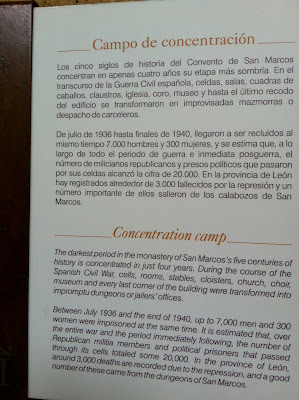The purpose of Newspeak was not only to provide a medium of expression for the world-view and mental habits proper to the devotees of IngSoc, but to make all other modes of thought impossible. It was intended that when Newspeak had been adopted once and for all and Oldspeak forgotten, a heretical thought -- that is, a thought diverging from the principles of IngSoc -- should be literally unthinkable, at least so far as thought is dependent on words. Its vocabulary was so constructed as to give exact and often very subtle expression to every meaning that a Party member could properly wish to express, while excluding all other meaning and also the possibility of arriving at them by indirect methods. This was done partly by the invention of new words, but chiefly by eliminating undesirable words and stripping such words as remained of unorthodox meanings, and so far as possible of all secondary meaning whatever.
(...)
So did the fact of having very few words to choose from. Relative to our own, the Newspeak vocabulary was tiny, and new ways of reducing it were constantly being devised. Newspeak, indeed, differed from most all other languages in that its vocabulary grew smaller instead of larger every year. Each reduction was a gain, since the smaller the area of choice, the smaller the temptation to take thought. Ultimately it was hoped to make articulate speech issue from the larynx without involving the higher brain centers at all. This aim was frankly admitted in the Newspeak word duckspeak, meaning ' to quack like a duck'. Like various other words in the B vocabulary, duckspeak was ambivalent in meaning. Provided that the opinions which were quacked out were orthodox ones, it implied nothing but praise, and when The Times referred to one of the orators of the Party as a doubleplusgood duckspeaker it was paying a warm and valued compliment.
(...)
And it was to be foreseen that with the passage of time the distinguishing characteristics of Newspeak would become more and more pronounced -- its words growing fewer and fewer, their meanings more and more rigid, and the chance of putting them to improper uses always diminishing.
George Orwell "The Principles of Newspeak", aditamento a "1984"
(...)
So did the fact of having very few words to choose from. Relative to our own, the Newspeak vocabulary was tiny, and new ways of reducing it were constantly being devised. Newspeak, indeed, differed from most all other languages in that its vocabulary grew smaller instead of larger every year. Each reduction was a gain, since the smaller the area of choice, the smaller the temptation to take thought. Ultimately it was hoped to make articulate speech issue from the larynx without involving the higher brain centers at all. This aim was frankly admitted in the Newspeak word duckspeak, meaning ' to quack like a duck'. Like various other words in the B vocabulary, duckspeak was ambivalent in meaning. Provided that the opinions which were quacked out were orthodox ones, it implied nothing but praise, and when The Times referred to one of the orators of the Party as a doubleplusgood duckspeaker it was paying a warm and valued compliment.
(...)
And it was to be foreseen that with the passage of time the distinguishing characteristics of Newspeak would become more and more pronounced -- its words growing fewer and fewer, their meanings more and more rigid, and the chance of putting them to improper uses always diminishing.
George Orwell "The Principles of Newspeak", aditamento a "1984"

















